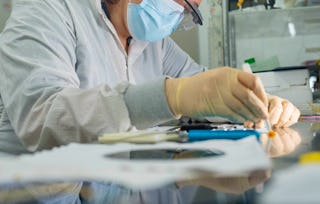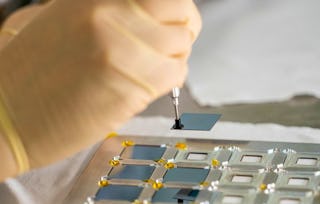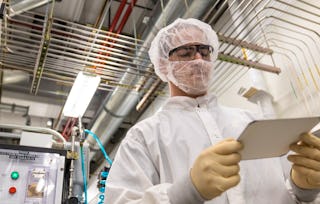Throughout this course, you will be introduced to Pathway for Assembly and Packaging technologies for 7-nanometer silicon feature sizes and beyond. The course will present the evolution and impact of packaging on product performance and innovation. Specifically, we highlight how packaging has enabled better products via the use of heterogeneous integration by improving the interconnects for thermal management and signal integrity.

Advanced Semiconductor Packaging

Advanced Semiconductor Packaging
This course is part of Semiconductor Packaging Specialization

Instructor: Terry Alford
3,514 already enrolled
Included with
87 reviews
What you'll learn
Introduction to Pathway for Assembly and Packaging technologies
The evolution and impact of packaging on product performance and innovation.
Skills you'll gain
Details to know

Add to your LinkedIn profile
5 assignments
See how employees at top companies are mastering in-demand skills

Build your subject-matter expertise
- Learn new concepts from industry experts
- Gain a foundational understanding of a subject or tool
- Develop job-relevant skills with hands-on projects
- Earn a shareable career certificate

There are 6 modules in this course
Welcome to Advanced Packaging! Throughout this course, we will introduce you to Pathway for Assembly and Packaging technologies for 7-nanometer silicon feature sizes and beyond. We will present the evolution and impact of packaging on product performance and innovation. Specifically, we highlight how packaging has enabled better products via the use of heterogeneous integration by improving the interconnects for thermal management and signal integrity. Thank you for joining us & we hope you enjoy the materials!
What's included
1 video2 readings
In this module you will watch a lecture video by Ravi Mahajan who is an Intel Fellow and the Director of Pathfinding for Assembly and Packaging technologies for 7-nanometer (7nm) silicon and beyond in the Technology Development and Manufacturing Group at Intel Corporation. In this module Dr. Mahajan will discuss the evolution and impact of packaging on product performance and innovation. He shows how packaging has enabled better products using heterogeneous integration (HI) by improving the interconnects, signaling, power delivery and thermals over the years.
What's included
1 video1 reading1 assignment
In this module Dr. Mahajan will discuss how advanced packaging technologies enable the integration of diverse components and functionalities into microelectronics systems. You will learn about the importance of advanced packaging for the future of computing and communication.
What's included
1 video1 reading1 assignment
In this module Dr. Mahajan will discuss how interconnect scaling can enable complex multi-chip packages (MCPs) that combine different types of chips and technologies. You will learn about the various interconnect options and trade-offs for MCPs, and how to blend 2D and 3D architectures.
What's included
1 video1 reading1 assignment
In this module Dr. Mahajan will discuss the trends in interconnect scaling for microelectronics systems. You will learn how 2D and 3D die-to-die (D2D) interconnects can enable high performance, how D2D link standardization can facilitate systematic and modular design of multi-chip packages (MCPs), and how co-packaging optics can address the challenge of off-package bandwidth scaling in future systems.
What's included
1 video1 reading1 assignment
In conclusion of Advanced Packaging, we would like to summarize the main takeaways. Starting with Pathway for Assembly and Packaging technologies, we discussed trends in interconnect scaling of microelectronics systems 7-nanometer (7nm) silicon and beyond. During our presentations, we saw how 2D and 3D die-to-die (D2D) interconnects can enable high performance and can facilitate the systematic and modular design of multi-chip packages (MCPs). Turning to the future, we estimated how co-packaging optics could address the challenge of off-package bandwidth scaling in future systems.
What's included
1 video1 assignment
Earn a career certificate
Add this credential to your LinkedIn profile, resume, or CV. Share it on social media and in your performance review.
Instructor

Offered by
Explore more from Electrical Engineering
 Status: Free Trial
Status: Free TrialArizona State University
 Status: Free Trial
Status: Free TrialArizona State University
 Status: Free Trial
Status: Free TrialArizona State University
 Status: Preview
Status: Preview
Why people choose Coursera for their career

Felipe M.

Jennifer J.

Larry W.

Chaitanya A.
Learner reviews
- 5 stars
75.86%
- 4 stars
17.24%
- 3 stars
4.59%
- 2 stars
1.14%
- 1 star
1.14%
Showing 3 of 87
Reviewed on Mar 28, 2024
Very well deliverd and extremely pleased with the contents
Reviewed on Feb 5, 2024
This course provides a great overview and Roadmap for Heterogeneous Integration and Advanced packaging. A great starting point for anyone who wants to explore the world of HI.

Open new doors with Coursera Plus
Unlimited access to 10,000+ world-class courses, hands-on projects, and job-ready certificate programs - all included in your subscription
Advance your career with an online degree
Earn a degree from world-class universities - 100% online
Join over 3,400 global companies that choose Coursera for Business
Upskill your employees to excel in the digital economy
Frequently asked questions
To access the course materials, assignments and to earn a Certificate, you will need to purchase the Certificate experience when you enroll in a course. You can try a Free Trial instead, or apply for Financial Aid. The course may offer 'Full Course, No Certificate' instead. This option lets you see all course materials, submit required assessments, and get a final grade. This also means that you will not be able to purchase a Certificate experience.
When you enroll in the course, you get access to all of the courses in the Specialization, and you earn a certificate when you complete the work. Your electronic Certificate will be added to your Accomplishments page - from there, you can print your Certificate or add it to your LinkedIn profile.
Yes. In select learning programs, you can apply for financial aid or a scholarship if you can’t afford the enrollment fee. If fin aid or scholarship is available for your learning program selection, you’ll find a link to apply on the description page.
More questions
Financial aid available,

